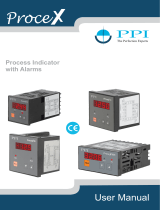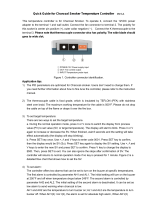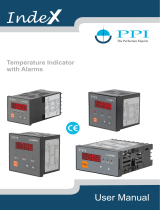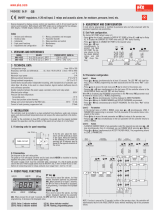
www.ako.com
1544H002 Ed.01
ON/OFF Controller’s size 48x48 mm
Index
1- VERSIONS AND REFERENCES
MODEL
AKO-15440
AKO-15490
20 to 48 V
100 to 240 V ~ 50/60 Hz
The controller should be installed in a place protected from vibrations, water and corrosive
gases, and where ambient temperature does not surpass the value specified in the
technical data.
In order for the controllers to have IP55 protection, the gasket should be properly installed
between the apparatus and the perimeter of the panel cut-out where it is to be fitted.
In order to give a correct reading, the probe should be installed in a place without heat
influences other than the temperature that is to be measured or controlled.
To fix the unit, place the fasteners in the top and the lower parts and press them to enter
in the controller lateral sliders. Move the fasteners in direction to the panel until the
controller is fixed.
GB
5- ADJUSTMENT AND CONFIGURATION
It should only be programmed or modified by personnel who are fully conversant with the
equipment operation and possibilities.
LED OUT1:
CONTROL indicator activated.
LED AL1: indicator enabled.
Flashing: Alarm 1 detected,
relay deactivated but signalling
maintained.
LED OUT2/AL2:
Alarm 2 indicator enabled.
Flashing with Alarm 2: Alarm2
detected, relay deactivated but
signalling maintained.
5.1 Set Point temperature:
Range according to type of sensor configured:
Pt100 . . . . . . . . . . . . . . . . . . . . . . . . . . . . . . . . –99,9 ºC to 850,0 ºC ( -148 ºF to 1562 ºF)
J Thermocouple . . . . . . . . . . . . . . . . . . . . . . . . . –99,9 ºC to 800,0 ºC ( -148 ºF to 1472 ºF)
K Thermocouple . . . . . . . . . . . . . . . . . . . . . . . –99,9 ºC to 1370,0 ºC ( -148 ºF to 2498 ºF)
Set Point range . . . . . . . . . . . . . . . . . . . . . . . . . . . . . . . . . . . . . . . . .–99,9 to 2500 (ºC / ºF)
Resolution, Set Point and differential . . . . .0,1 or 1 (ºC / ºF) configurable by parameter rES
Accurancy . . . . . . . . . . . . . . . . . . . . . . . . . . . . . . . . . . . . . . . . . .± 0,25% (Pt100, TcJ, TcK)
R1 relay: CONTROL or ALARM 2 (configurable by param. Clo): SPST-NO, 6A, 250V, cosϕ=1
R2 relay: ALARM 1 . . . . . . . . . . . . . . . . . . . . . . . . . . . . . . . . . . . . . SPDT, 5A, 250V, cosϕ=1
Maximum input power . . . . . . . . . . . . . . . . . . . . . . . . . . . . . . . . . . . . . . . . . . . . . . . . . 3 VA
Working ambient temperature . . . . . . . . . . . . . . . . . . . . . . . . . . . . . . . . . . . . . .0 ºC to 55 ºC
Storage ambient temperature . . . . . . . . . . . . . . . . . . . . . . . . . . . . . . . . . . . .–30 ºC to 70 ºC
Installation category . . . . . . . . . . . . . . . . . . . . . . . . . . . . . . II under EN 61010-1 Standard
Pollution degree . . . . . . . . . . . . . . . . . . . . . . . . . . . . . . . . . . II under EN 61010-1 Standard
Double insulation between the power supply, the secondary circuit and the relay output.
SUPPLLY
2- TECHNICAL DATA
3- INSTALLATION
3.1 Fastening:
PANEL
CUT-OUT
45 mm
45 mm
max. 13mm
105 mm
The probe and its lead should NEVER be installed in ducting along with power, control or
power supply wiring.
The power supply circuit should be connected with a minimum 2 A, 230 V, switch located
close to the unit. Power supply cables should be H05VV-F 2x0.5 mm
2
or H05V-K 2x0.5 mm
2
.
Section of connecting wires for relays contacts should range from 1 mm
2
to 2.5 mm
2
.
3.2 Connection:
4- FRONT PANEL FUNCTIONS
Controller designed to display and control heating or cooling generators, with input for
Pt100, Thermocouple J or Thermocouple K type sensors. Relay outputs may be used for
control and/or alarm. It also has a logic output/input for control/alarm.
1 - Versions and references
2 - Technical Data
3 - Installation
4 - Front Panel functions
5 - Adjustment and Configuration
6 - Menus, parameters and messages
7 - Parameters Transfer
8 - Control and alarms operation
9 - Maintenance
10 - Warnings
1
2
3
4
5
6
15
14
13
12
11
10
TOP
R2
Pt100
TC
+
–
+
–
R1
N
L
DIGITAL
Input
SSR Output
SETPRG
OUT1 OUT2/Al2AL1 AT
SV
PV
318.0
318.5
DOWN Key
Accepts the alarms and disconnects alarm
outputs. In programming, it makes the displayed
value reduce.
SET Key
Accepts the alarms and disconnects alarm
outputs. In programming, accept the programmed
new value.
SET
UP Key
Accepts the alarms and disconnects alarm
outputs. In programming, it makes the displayed
value increase.
PRG Key
Accepts the alarms and disconnects alarm
outputs. When pressed for at least 3 seconds, the
SP SET POINT temperature value is displayed.
When pressed for 10 seconds display the first
level of menu SPCF of parameters. Exit
programming level.
PRG
The factory SET POINT default value is 0,0 ºC.
- Press PRG key for at least 3 seconds to DISPLAY SET POINT SP. It displays the CURRENT
SET POINT value.
- Press or keys to CHANGE SET POINT into the required value.
- Press SET key to ACCEPT THE NEW SET POINT. The display returns to the CURRENT
TEMPERATURE display status.
5.2 Parameters configuration:
Level 1 Menus
- Press PRG key for at least 10 seconds. We are in the programming LEVEL 1 MENUS and
the first menu “SPCF” is displayed.
- Press key to access the next menu and key to return to the previous one.
- Press PRG key, the controller returns to the CURRENT TEMPERATURE display status.
When PAS is displayed, PASSWORD programmed in PAS1 parameter of PAr menu should
be entered to access programming LEVEL 1 MENUS.
- Press
or keys to CHANGE NUMBER and DISPLAY PASSWORD programmed.
- Press SET key to ACCEPT PASSWORD. The first menu “SPCF” will be displayed.
Level 2 Parameters
- In the desired menu of LEVEL 1 MENUS, press key SET. LEVEL 2 PARAMETERS
programming is accessed. The first parameter of the selected menu is displayed on the
screen.
- Press
key to access the next parameter and key to return to the previous one.
- Press PRG key, returns to the LEVEL 1 MENUS.
Level 3 Values
- Press SET key to enter and modify the desired parameter.
- Press
or keys to CHANGE VALUE.
- Press SET key, ACCEPT THE NEW VALUE and it returns to LEVEL 2 PARAMETERS.
- Press PRG key, it returns at LEVEL 2 PARAMETERS without modify value.
SET
PV
SV
23.5
50.0
PV
SV
0.0
SP
PV
SV
23.5
SP
PRG
DISPLAY
SET POINT SP
CHANGE
SET POINT
ACCEPT
THE NEW
CURRENT
TEMPERATURE
CURRENT
SET POINT
NEW
SET POINT
3 Sec.








